Matt Siders
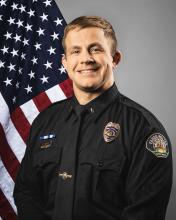
Lieutenant Matt Siders has served with the Fargo North Dakota Police Department since 2009. His current assignment is as the Night Shift Commander in the Neighborhood Services Division. Before this role, he was a Sergeant assigned to the Professional Accountability Unit. This unit deals with internal investigations; use of force reports; creating new policies; policy changes and additions; policy maintenance; and policy, procedure and case law training in the department. He has also spent time as a Patrol Sergeant, School Resource Officer, Police Training Officer, Defensive Tactics Instructor, and Patrol Officer. Lieutenant Siders is the team lead on his department’s Wellness Team. He has been instrumental in implementing initiatives to improve the physical wellness and mental health of his department.
Lieutenant Siders’ research interests include analyzing use of force data to create more effective training plans and best practices for de-escalation, and effectively controlling subjects; analyzing promising strategies and programs to increase officer resilience and improve mental health; and, studying effective uses of early intervention systems and evidence based solutions to increase support for law enforcement officers struggling with work related stress, fatigue and declining mental health.
Ashley Kierpaul

Sergeant Ashley Kierpaul has served at the Michigan State Police (MSP) since 2016. She is currently assigned as a police psychologist for MSP’s Office of Behavioral Science. Here, Sergeant Kierpaul provides psychological services for department members, including individual, group, and couples therapy, critical incident debriefs, psychoeducation classes, and psychological assessments for incoming recruits. She also serves first responders and veterans outside of the agency through private practice work.
Sergeant Kierpaul received her bachelor’s degree in psychology at Michigan State University. She received her master’s degree in clinical psychology and her clinical license through the Michigan School of Psychology, where she received the Conceptual Research Award at the school’s 2021 research symposium for her group therapy proposal for first responders.
Prior to her current assignment, Sergeant Kierpaul was assigned as a trooper to the Houghton Lake and Brighton Posts. In 2019, she received the Samuel L. Mapes Award after leading her worksite with the most investigative felony arrests. She was promoted to the Recruiting and Selection Section after she revived MSP’s youth explorer programs. In 2022, MSP acknowledged Sergeant Kierpaul’s work through a Professional Excellence Award after she established explorer programs at eight posts across Michigan. Sergeant Kierpaul also served as a military police lieutenant in the Michigan Army National Guard, where she received an Army Achievement Medal in 2021 for her work at the Vibrant Response multi-state disaster training exercise.
Sergeant Kierpaul’s research interests include developing and evaluating treatment modalities for first responders and veterans to combat the cumulative effects of trauma and stress accumulated through their career. Sergeant Kierpaul’s current focus is on implementing group therapy programs that both resonate with this population and are effective at reducing psychological symptoms associated with the work.
Duwayne Poorboy

Sergeant Duwayne A. Poorboy has served the San Marcos, Texas, Police Department for over 18 years and is the supervisor of the Special Investigations Unit. Before this role, he supervised the crime reduction, field training, and K-9 units. He has worked as a patrol officer, field training officer, criminal investigations division detective, and narcotics task force detective. In 2015, Sergeant Poorboy received his Department’s Officer of the Year award and the Texas Narcotics Officers Association Central Region Detective of the Year for his work as a co-case agent in a multi-year FBI investigation into the Texas Mexican Mafia. Sergeant Poorboy was also a member of the Hays County SWAT Team’s Crisis Negotiation Unit for 15 years and was the team leader. He continues to assist in the annual Texas State University Hostage Negotiation Competition and Seminar hosted by Dr. Wayman Mullins. Sergeant Poorboy is a 3rd year Ph.D. student in the School of Criminal Justice and Criminology at Texas State University. His research interests include spatial-temporal crime patterns, problem-oriented policing, and hostage/crisis negotiation. Sergeant Poorboy is currently working on projects with Dr. Lucia Summers from Texas State University’s Center for Geospatial Intelligence and Investigation.
Marisol Cortez
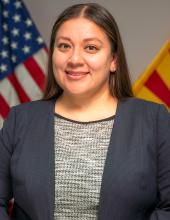
Marisol Cortez serves as the Operations Program Supervisor for the Analytics Unit, Training Division with the Maricopa County Sheriff’s Office (MCSO) in Phoenix, Arizona. She has a multidisciplinary educational background in Criminology and Criminal Justice, Social Work with an emphasis in Policy, Administration and Community Practices, and Geographic Information Systems (GIS). She is a Faculty Associate for Arizona State University, School of Criminology and Criminal Justice.
From data collection, analysis, crime mapping, and program evaluation, to curriculum development and training delivery, her philosophy as a research practitioner is to support public safety by promoting data-driven informed decision-making. She is passionate about research that implements evidence-based practices for effective sustainable operations, and developing programs that support workforce development/retention and organizational cohesion.
Her professional experience over the past decade has ranged from opportunities to support research in academic partnerships with local city law enforcement agencies, leading strategic initiatives impacting the criminal justice system within county government, to training and capacity building of law enforcement officers in-service locally, and civilian crime analysts professionals abroad. Marisol is excited to join other LEADS scholars in efforts to advance research and evidence-based practices that address agency needs, serve the community, and the field of law enforcement.
Susan Farag, JD

Susan Farag is a senior public safety policy and budget analyst with the Montgomery County Council in Maryland. With more than 15 years of experience in public safety policy, research, budgeting, and analysis, she advises the Council and other policymakers on affordable, evidence-based policing practices. While her work spans policing, fire and rescue, EMS, corrections, and the courts, her recent work has focused on policing policy and organizational initiatives.
She has served in multiple advisory and analytical roles related to changes in policing policy, including providing expert guidance to the County Executive’s Task Force on Public Safety and its subsequent Implementation Committee. She also provides staff support to the Advisory Commission on Policing, a civilian advisory body that advises the Council on police practices.
Most recently, Susan has worked with the Council, the Montgomery County Police Department, and other local law enforcement agencies to fund and implement technology-based approaches to public safety. She is especially interested in identifying where well-intentioned policy changes or technology deployments fall short, create new risks, or produce unintended consequences. Her role is to assess the full landscape of options and tradeoffs and to translate research and complex data into practical guidance for policymakers and public safety leaders.
Susan holds a J.D. from the University of Baltimore School of Law and is pursuing certification in data analytics. Her research interests focus on organizational design and performance, public confidence, and how these together influence public safety outcomes.
Sean Frost
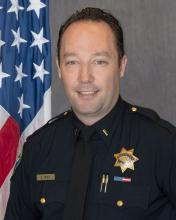
Captain Sean Frost has served in the San Francisco Police Department since 2005. His current assignment is at the Homeland Security Unit in the Special Operations Bureau coordinating security planning for major events occurring in or impacting the City such as the 2025 NBA All-Star Weekend, Super Bowl LX, and the FIFA World Cup. Prior to this role, Sean helped develop a system to more accurately determine officer discretion in enforcement action.
Throughout his career he has worked in uniformed patrol and plainclothes investigative assignments, including the Fugitive Recovery Enforcement Team (FRET), the violence reduction team, and the criminal investigations unit in the major crimes division. In November of 2023, Sean served as the logistics chief when San Francisco hosted the Asia Pacific Economic Cooperation (APEC) attended by the President and Vice President of the United States and over twenty foreign heads of state.
Sean has completed two master’s degrees, a Master of Science in Law Enforcement and Public Safety Leadership from the University of San Diego, and a Master of Studies in Applied Criminology and Police Management from the University of Cambridge in the United Kingdom. His research interests include analysis of stop data, crime reduction, and the effectiveness of new technology in policing.
Melissa Thompson

Commander Melissa Thompson has 17 years of experience with the Waco Police Department. She currently serves as a midnight patrol commander. Throughout her career, Commander Thompson has held various positions which include Homicide, Robbery, Narcotics and Sex Crimes. Commander Thompson has supervised the Street Crimes Unit and the Neighborhood Engagement Team. Commander Thompson was instrumental in implementing the Law Enforcement Against Drugs & Violence (LEAD) program in Waco to combat the growing problem of violence in youth. For her dedication, she was recognized and placed on a National Law Enforcement Executive Leadership Council within LEAD. Additionally, she served on a subcommittee for the Women’s Law Enforcement Executive Committee and assisted in developing a Mentoring program for Women in Texas. Commander Thompsons research interests include a longitudinal study on the effects of the LEAD program as well as the effectiveness of mentorship programs in developing future leaders. She holds a BA in Criminal Justice Administration and Masters in Public Administration from Tarleton State University. She was recently accepted into the Doctoral program at Tarleton State University and will be starting in the Fall.
Chris Mastroianni

Chris Mastroianni is a Sergeant for the Hartford Police Department in Connecticut. He has extensive law enforcement experience leading the Department’s Intelligence Division and Real-Time Crime Center. He also has investigative experience in proactive Street Crimes Units, Shooting Task Force, and Narcotics Unit. He has overseen the management and implementation of citywide focused deterrence violence reduction initiatives and liaisons with the city’s community-based organizations to identify drivers of violence in the community. He has vast experience and knowledge in the world of police technology, its implementation, success, and its effect on crime solvability. He has also developed data collection protocols to build capacity for timely violence analysis and responses. Chris is very interested in researching the effects of technology on police investigations. He recently co-authored a peer reviewed case study on the effects of video evidence and RTCC activities on shooting investigations. He is also interested in gun violence research and works part time as a research assistant in which he has collected, coded, and synthesized data for violence problem analyses in several cities nationwide. Additionally, Chris is also part of the Media Relations Unit and is a gang instructor at the police academy.
Joe Polzak, JD

Joe Polzak advises the City of Sarasota and the Sarasota Police Department (SPD) on governance, risk, and compliance as the City Attorney for Sarasota. Previously, he served as an Assistant City Attorney for the City of Sarasota since 2014. He works closely with SPD as a U.S. National Institute of Justice (NIJ) Law Enforcement Advancing Data and Science (LEADS) Scholar and a Special Assistant State Attorney working on SPD cases. As a LEADS Scholar, his research interests focus on the development of evidence-based programming to help local government stay out in front of rapidly developing, complex, and nuanced authority and oversight, and advance the legitimacy of their operations throughout their communities. Mr. Polzak formerly served full time as a felony prosecutor for the State of Florida after earning a Bachelor of Science in Political Science, magna cum laude, from Florida State University and a Juris Doctor from Stetson University College of Law, with an Honors Certificate in International Law.
Mr. Polzak has been selected to present best practices in governance at many national conferences including the International Association of Chiefs of Police, CIT International, and the International City/County Management Association, and has co-presented at events with the Council of State Governments, National Policing Institute, and the Bureau of Justice Assistance. Mr. Polzak was co-recipient of the Sarasota NAACP President’s Award for co-developing SPD’s homelessness response program with the SPD Patrol Division Commander. This program was selected for the IACP Leadership in Human and Civil Rights Award. He also developed an environmental compliance program for the Sarasota Powerboat Grand Prix, which was selected for the IACP David C. Cameron Leadership in Environmental Crimes Award.
John Wagstaff, Jr.

Sergeant Wagstaff joined the Durham Police Department in 2015 after years of early career exposure as a police explorer with both the Durham (NC) and Charleston (SC) Police Departments. Assigned to the Organized Crime Division, Wagstaff is charged with directing innovative solutions at emergent crime trends while overseeing key strategic projects. He previously led a uniform patrol squad in a district serving over 100,000 residents and supervised investigators in the Special Victims Unit.
A staunch advocate of evidence-based policing, Sergeant Wagstaff has worked to translate research into practice for over a decade. Locally, he has championed a trauma-informed response to intimate partner violence and pioneered an environmental management approach for reducing the consequences of disruptive college partying while building collective efficacy. He has co-authored empirical research on the relationship between citizen oversight and procedural justice published in the American Journal of Criminal Justice. His role as a Policing Fellow with the National Policing Institute since 2018 further underscores his commitment to shaping policing practices on a national front.
Sergeant Wagstaff holds a bachelor’s degree in Business Administration and Spanish from the College of Charleston and a master's degree in Criminal Justice - Public Administration from Liberty University. He has an Advanced Law Enforcement Certificate from the NC Criminal Justice Education and Training Standards Commission and is a General Instructor (adjunct). His research interests include police accountability, procedural justice and police legitimacy, and organizational change.
Daniel Grispino

Daniel Grispino has a combined 22 years of law enforcement experience and was appointed Chief of Police with the City of Beachwood, Ohio in September of 2024.
Chief Grispino began his law enforcement career in 2002 and in 2006, Grispino joined the Shaker Heights Police Department, Ohio. In 2015, he was promoted to Sergeant in the Uniform Bureau, until he was assigned to investigations as the Intelligence Unit Sergeant in 2018. In 2019, Grispino was promoted to Lieutenant in the Uniform Bureau and the Community Engagement Unit. In 2023, he was promoted to Commander of the Uniform Bureau, a position he held until being appointed Chief of Police with the City of Beachwood, Ohio.
Grispino holds a B.S. in Criminology and Sociology and an M.S. in Criminal Justice Administration. He is a graduate of Northwestern University Police Staff and Command and the Ohio Law Enforcement Foundation Police Executive Leadership College. Commander Grispino has also completed coursework recognizing him as a Certified Law Enforcement Executive (CLEE) within the State of Ohio. He is also an adjunct instructor with Northwestern University.
In 2023 Grispino authored a federal grant securing funding for the first ever Regional Mental Health Response program within Ohio and the Nation. This continues to be his area of focus for research and continued development.
Josie Wolfe

Josie Wolfe serves as the Research Scientist and Evaluator for the Greensboro Police Department (GPD) in Greensboro, NC. In this role, she leads agency efforts in designing, implementing, and assessing evidence-based interventions and evaluations. Through grant-funded research, external partnerships, and internal evaluations, Josie integrates best practices to support the GPD's goals. She brings over a decade of law enforcement experience in the areas of field research, methodology, analysis, community engagement, program evaluation, and public information.
Josie holds a Bachelor of Arts in Criminal Justice and Political Science and a Master of Science in Criminal Justice, both from the University of North Carolina at Charlotte. She is currently a doctoral student specializing in Measurement, Research Methodology, and Program Evaluation at the University of North Carolina at Greensboro. Her research interests include program evaluation, the application of evidence-based practices in local government, survey methodology, officer retention, community perceptions of law enforcement, and law enforcement-based victim services. Josie is particularly passionate about pursuing research and evaluation that benefits the lives and work of officers.
Through the LEADS Scholars program, Josie looks forward to collaborating with others, promoting an evidence-based policing culture, and bringing valuable partnerships and resources to the City of Greensboro.
David Miner, Ph.D.
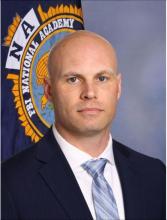
Detective Lieutenant Miner has been a member of the Groton Town Police Department for 20 years. Presently assigned as the Commander of the Criminal Investigation Division. In this role, Miner is responsible for the effective and ethical oversight of major crimes investigation. He also has supervisory responsibility for the agency evidence function, digital forensics laboratory, and task force operations. Miner is currently a Citizens Police Academy instructor, Awards Board Chair, Crisis Intervention Team (CIT) Coordinator, Draeger Instructor, CT POST and CALEA Accreditation Manager, CT POST Accreditation Assessor, CALEA site-based assessor, and the Peer Support Team Commander. During his tenure in these command roles, his agency was recognized by the National Police Foundation for small and rural agency crisis response innovative programs. The department was awarded its initial state POST accreditation in June 2023 and initial CALEA accreditation in March 2024. He has additionally held roles as a narcotics detective, patrol commander, and union president.
As part of an executive leadership series on missing and exploited children training, Miner created a community action plan designed to impact policy on locating missing children from state run facilities. As the CIT Coordinator, he gathered data on crisis intervention team encounters and submit quarterly reports to Chief of Police. At the end of year 2022, he analyzed the data using SPSS for associations among the variables and discovered that there was a significant association between intoxication and crisis. The findings helped secure funding for a community outreach specialist position within the department.
Miner received a Bachelor of Arts in Sociology from the University of Connecticut, a Master of Science in Criminal Justice Administration from Columbia College, and a Doctor of Criminal Justice from Saint Leo University. His dissertation focused on the effects of shift work on police officer aggression. He is the first sworn officer of my department to receive a terminal degree in law enforcement. Miner is a graduate of the Capital Region Chiefs of Police Association Leadership Academy, the New England FBI Regional Command College, and the FBI National Academy Session 286 where he was selected to participate in the International Partnership Program (IPP) and where he received a Graduate Certificate in criminal justice education.
His primary areas of research interest are officer wellness, juvenile justice, and crisis intervention.
Joe Treviño

Joe Treviño is a Criminalist in the Firearms Analysis Section (FAS) of the NYPD Police Laboratory. He has introduced new ways to apply existing NIBIN data to field operations, with a focus on including non-fatal shooting incidents to complete the follow-the-gun approach to crime gun intelligence. Joe is currently developing and exploring projects that support a data-driven and modular forensic intelligence policy that is portable and scalable for law enforcement agencies.
Prior to his assignment to the FAS, Joe was assigned to the Quality Assurance Section (QAS) of the NYPD Crime Scene Unit (ISO/IEC 17020:2012, ANAB AR3120:2020) where he provided administrative and operational support as well as technical assistance to scene investigations. Joe worked with the Garland Police Department in Garland, Texas as a Forensic Investigator (CSI + Latent Print Examiner) for 5 years before his employment with NYPD.
Joe holds a Bachelor of Science in Forensic Chemistry from Sam Houston State University, a Master of Science in Forensic Science from Pace University, and is a doctoral student (Doctor of Forensic Sciences) at Oklahoma State University. He is an Adjunct Assistant Professor in the Forensic Science Program at Pace University. Joe’s research interests also include CSI staffing levels and identifying minimum education requirements and expectations of entry-level applicants to forensic science positions. He was recently published in the Journal of Forensic Identification for his pilot study on adequate CSI staffing levels, a research need highlighted by the Organization of Scientific Area Committees for Forensic Science (OSAC). Joe is a member of the American Academy of Forensic Sciences (General Section - Associate Member), the International Association for Identification, and the Texas Division of the International Association for Identification.
Billy White
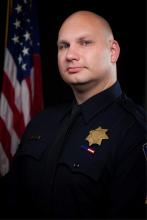
Captain Billy White has over a decade of experience at the Tulsa Police Department. He is currently a shift commander over the Gilcrease Division, where he works with patrol, Downtown Impact, and the traffic unit. Prior to being promoted Captain, he served in Internal Affairs and was a Platoon Leader on the Special Response Team. Captain White was in charge of the Riverside Street Crimes unit where he focused on using crime data to target individuals who habitually offend to reduce crime. During this time, he spearheaded Operation Heavy Metal, which disrupted crime on a national level. Captain White also worked at the training division, where he ran the recruiting unit for the department.
Outside of police work, Billy has pursued higher education, receiving his M.S. in Criminal Justice from Northeastern State University and then his Ph.D. from Nova Southeastern University. He has a passion for teaching within his department as well out at several local universities where he is an adjunct professor. His research interests include police selection methods, police retention, and crime reduction.
Kelly Robbins
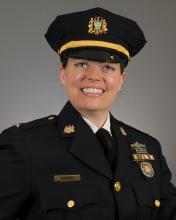
Lt. Kelly Robbins has served the Philadelphia Police Department for 16 years and currently works as the Executive Officer for the Department's Chief Strategy Officer. Prior to this position, she was the commanding officer of the Records and Identification Unit, the administrative sergeant to the Regional Operations Command (South), patrol sergeant in the 9th district, and officer in the 25th district. She served as the planning officer for the PPD's deployment during the Democratic National Convention, NFL Draft and Papal visit. She is proud to have served as one of the Department’s first trained crime analysts while simultaneously being a member of the 25th district’s pro-active tactical patrol team. Lt. Robbins recently placed #2 in the testing process for the rank of Captain. She completed her M.S. at the University of Pennsylvania, the School of Police Staff and Command at Northwestern University, and the Applied Criminology and Data Management Program with the American Society of Evidence Based Policing. Her research interests include procedural justice, linguistic anthropology, and culture as they relate to effective policing in a democratic society. Her most recent research study involves the analysis of body worn camera video of vehicle stops and how relationships between procedural justice, coercion and perception of law enforcement interact.
Andrew Graham
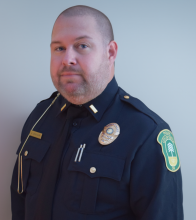
Lieutenant Andrew Graham has been employed with the Tuttle Police Department, in central Oklahoma, since 2006. He is currently assigned as shift commander of the overnight shift. Lieutenant Graham also ensures that all officers in the department receive ongoing training in department standards and policies. He also manages several grant programs and their related budgets.
Lieutenant Graham serves as the accreditation manager for the agency and ensures that all policies and standards comply with accreditation standards established by the Oklahoma Association of Chiefs of Police (OACP). Andrew also serves as an agency accreditation assessor for the OACP.
Lieutenant Graham has earned a BA in Criminal Justice from the University of Oklahoma and an MS in Criminal Justice from the University of Oklahoma. Lieutenant Graham also earned an Advanced Peace Officer Certification from the State of Oklahoma.
Lieutenant Graham's research interests include the application of evidence-based policing practices to small and rural law enforcement agencies.
Kimberly Alan
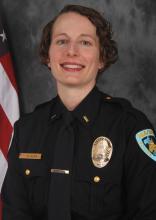
Lieutenant Kimberly Alan is a 12-year veteran of the City of Madison Police Department. Lt. Alan served in patrol, Professional Standards and Internal Affairs, and as a Neighborhood Officer prior to her assignment as the afternoon shift Officer-in-Charge.
Lt. Alan holds a Master of Science Degree in Criminal Justice from the University of Wisconsin. She recently participated in the American Society of Evidence-Based Policing’s inaugural Applied Criminology and Data Management Program where she and her academic partner are examining characteristics of police recruits to improve systems that impact employee retention and career longevity. Her research interests include officer recruitment, retention and promotion; officer wellness; women in law enforcement; and the impact of technology on law enforcement and public safety.
Lt. Alan serves on the Women’s Initiatives Mayoral Committee for the City of Madison and is an elected County Board Supervisor for Iowa County, Wisconsin. Lt. Alan just started her second term as Treasurer for the Wisconsin Association of Women Police and has been a longtime board member of that organization.
Lt. Alan received the Coler-Williams Memorial Award for Leadership in 2006, a Madison Police Department Problem-Solving Citation in 2015, and an Outstanding Service Award in 2017.
Kevin Townsend
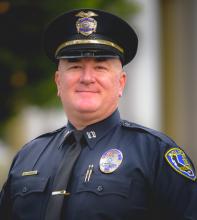
Kevin Townsend has over 27 years of experience and is a captain at the Riverside (CA) Police Department. He has worked a variety of operational and administrative assignments throughout his career. Captain Townsend is a graduate of Leadership Riverside, California's Supervisory Leadership Institute, the LAPD Leadership program, and Senior Management Institute for Police (SMIP). He earned a Bachelor of Science in Criminal Justice Administration and a Master of Public Administration degree. Captain Townsend earned a Doctor of Public Administration and is an adjunct college professor. He is interested in organizational change, leadership, crime reduction, officer safety and wellness, employee accountability, community relations, and evidence-based practices.
Jennifer Mitsch, Ed.D.

Lieutenant Jennifer Mitsch is a twenty-eight-year veteran of the Cincinnati Police Department (CPD). Lt. Mitsch has served in Patrol, Violent Crimes, Personal Crimes, Homicide, Planning Section, Real Time Crime Center and Fusion Center prior to her current assignment as the Homicide Unit Commander. She was responsible for the creation and development of the Cincinnati Citizens Respect Our Witnesses (CCROW) program and oversees numerous Department projects. Lt. Mitsch is a primary grant writer for the department and serves as a peer reviewer for a variety of grant solicitations.
Lt. Mitsch recently participated in the American Society of Evidence-Based Policing’s inaugural Applied Criminology and Data Management cohort where she partnered with a university researcher to explore CPD’s Real Time Crime Center. Her research interests include program evaluation, officer retention, officer wellness, use of force, witness/victim cooperation, and the impact of technology on law enforcement and public safety.
Lt. Mitsch holds a Doctor of Education in Leadership Development and Master of Science in Human Resource Development, both from Xavier University. Lt. Mitsch also serves as an adjunct professor at the University of Cincinnati and the University of Tennessee Chattanooga.
Ryan Manley
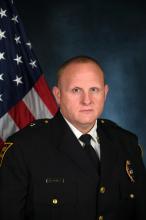
Ryan Manely was named Chief of the City of Albemarle, North Carolina, Police Department in early 2025.
Previously, he served as a District Captain with the City of Fayetteville, North Carolina Police Department since January 2022. Chief Manley had been with the Fayetteville department since 2002 holding various assignments ranging from a District Commander to the supervisor of the Crime Analysis Unit.
Chief Manley holds a Bachelor of Science degree in Criminal Justice and Political Science from the State University of New York College at Brockport and a Master of Science in Criminal Justice from Fayetteville State University. Chief Manley graduated from the North Carolina Justice Academy's Management Development Program Class #29 and earned his Advanced Law Enforcement Certificate from the North Carolina Training and Standards Commission. Chief Manley is the team commander for the Crisis Negotiation Team, participates in the Cumberland County Veterans Treatment Court, and is a departmental liaison to the Cumberland Fayetteville Crisis Intervention Team. Chief Manley commanded the Campbellton Patrol District and utilizes evidence-based policing practices to reduce the harm and impact of criminal behavior.
Chief Manley employs various evidence-based policing strategies to identify and quantify criminal behavior's effects within his patrol district. These strategies include projects utilizing the collective efficacy theory to improve community cohesion and eliminate specific areas causing undue risk to that community. He participates in research focusing on law enforcement's use of mental health diversion, the critical thinking process, and treatment courts. Chief Manley's research interests include justice-involved reform, mental health diversion, data collection and statistical analysis, and the community harm index. He's excited to utilize the LEAD program to bridge the gap between academia and law enforcement practitioners.
Philip Lukens
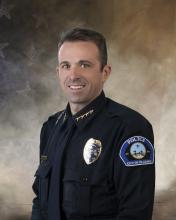
Chief Lukens began his successful law enforcement career in Colorado in 1995 as a police explorer. Currently serving as the Chief of Police in Alliance, Nebraska since December 2020, he has garnered multiple certifications, including Northwestern School of Police Staff and Command, PERF’s Senior Management Institute for Police, IACP’s Leadership in Police Organizations and a Bachelor of Science in Criminology from Colorado Technical University.
Chief Lukens is at the forefront of utilizing state-of-the-art technology to enhance police operations. By reducing staff hours needed for intelligence and administrative tasks, his department can prioritize human and victim-centered policing. Emphasizing AI on the backend, he ensures human officers and dispatchers remain readily available for direct interaction with the community.
His innovative approach includes sentiment analysis and efficiency analysis of body camera footage and transcriptions. Manual and digital algorithms for crime prevention and hot spot emphasis have been successfully implemented, optimizing patrol methods in the small city.
Dedicated to evidence-based practices and 21st-century policing, Chief Lukens has achieved remarkable results. Use of force incidents decreased by 85% in 2022, while overall crime saw a reduction of over 20% in the same year, and an additional 30% in 2023.
Chief Lukens continues to demonstrate a commitment to mission accomplishments and community safety, using data-driven strategies to ensure the Alliance Police Department's success.
Erik Halvorson
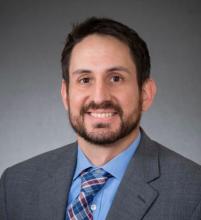
Erik Halvorson currently serves as an Operations Officer focused on anti-fraud program management for the US Department of Energy’s new funding expenditures within the Office of Investigations. This includes interfacing with DOE OIG’s analytics division where he supports work on a national proactive strategy and national inter- and intra-agency outreach. As an agent, he specialized in financial fraud and public corruption investigations with prosecutions in jurisdictions across the country. He has 17 years of federal law enforcement experience including both domestic and international work. Erik enjoys using advanced analysis techniques to proactively detect and investigate fraud. A Columbia University graduate, he holds degrees in criminal justice, accounting, and applied analytics. He is currently enrolled in a PhD program in Research Methods and Statistics at University of Denver. His dissertation will focus on text mining and sentiment analysis as a method to help inform emergency responses.
Finally, Erik started a small veteran owned business to tackle individual research projects and support businesses and non-profits with psychometrics, analytics, statistical analyses, program evaluations, research, and anti-fraud consulting.
Curtis Cheeks, III
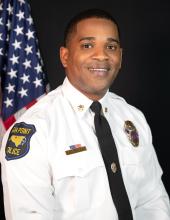
Curtis Cheeks III has served with the High Point Police Department for over 23 years. He holds a bachelor’s degree from the University of North Carolina at Pembroke and a master’s degree from Florida Metropolitan University. He also attended the 144th session of the Southern Police Institute’s Administrative Officers Course and is an FBI LEEDA Trilogy recipient. He served as the Assistant Chief of the Support Services Division. The Support Services Division oversees the department's Training officers, Recruiting officers, Emergency Management functions, Human Resource functions, Real Time Crime Center staff, Records/IT section, and Equipment personnel.
He also served as Commander of the Investigations Section (Major Crimes), Lieutenant over the Strategic Intelligence Unit, Community Engagement Unit, Public Information Office, and Field Training Supervisor. He also has experience as a Recruiting Officer, Field Training Officer, and Vice/Narcotics Detective. Throughout his career, he has been actively involved as a state-certified criminal justice instructor, and the department's implementation and continued efforts of focused deterrence in the areas of open-air drug markets, domestic violence, and violence related to gun crime.
His research interests include personnel recruitment, selection, and retention, leadership development, gun crime detection and prevention, and updating response practices to meet redefined expectations.
Leslie Taylor, Ph.D.

Leslie is a research, planning and evaluation professional with twenty-five years combined experience in program management, program implementation and evaluation, strategic planning, grants, and applied research.
He is currently the Program Services Manager in the Youth and Neighborhood Services Bureau where he oversees organizing and implementing assessments, performance reviews, evaluation, and applied research projects; and identifying current best practices and evidence-based strategies for supporting agency initiatives. His work focuses on research and program development, policy review/update and analysis, and data and information dissemination. He has also successfully developed, monitored, and evaluated evidence-based technical projects and grants for several Department of Law Enforcement units and divisions. He joined the Broward Sheriff’s Office in 2003 as a Research and Development Coordinator where he served as a research, planning and statistical resource for the largest sheriff’s agency in the state of Florida and performed professional supervisory work in the coordination and administration of various programs and projects.
Leslie holds a Master of Public Administration (MPA) from the University of North Florida and a Ph.D. in Public Administration (Policy and Planning) from Florida Atlantic University. He has published journal articles, book chapters and made presentations to academic as well as professional conferences. His research interests are in collaborative governance, juvenile justice, crisis intervention and emergency management. His passion is to teach and train the next generation of policy analysts and planners to become effective public leaders. He has instructed several graduate courses in policy and planning, executive leadership, criminal justice and crisis and emergency management as an Adjunct Professor at Florida Atlantic University and Nova Southeastern University.


